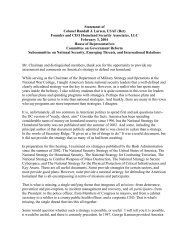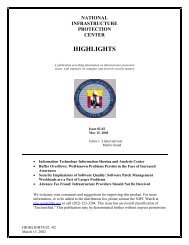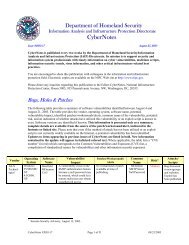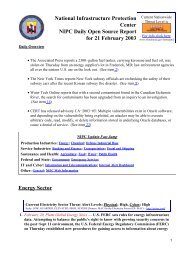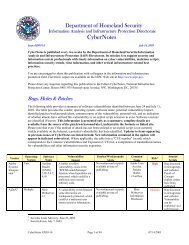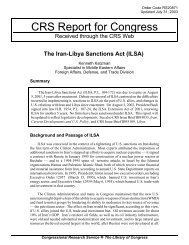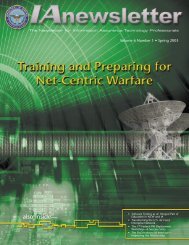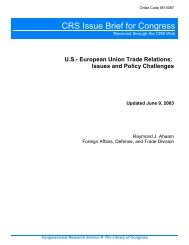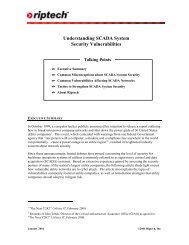beyond pt 0 23/1
beyond pt 0 23/1
beyond pt 0 23/1
Create successful ePaper yourself
Turn your PDF publications into a flip-book with our unique Google optimized e-Paper software.
E-commerce in the procurement of machinery and equipment was projected to<br />
compress wholesalers’ margins by 25–30 per cent over the period under<br />
consideration. Also e-commerce would increase competition and more<br />
sophisticated competition would put downward pressure on the producer’s prices.<br />
IRG Communications Working Group<br />
E-commerce was thought to be pretty fully implemented in supply areas like fuel,<br />
so little further impact was projected. People noted that there were conflicting<br />
trends on fuel utilisation arising from e-commerce—greater customisation meant<br />
more frequent deliveries of smaller loads, so possibly increased costs, but<br />
computer assisted routing meant that the effect was small.<br />
IRG Communications Working Group<br />
4.4 New costs<br />
Telecommunications companies in the sector are incurring costs in<br />
creating new products.<br />
Telecommunications companies (Telstra, O<strong>pt</strong>us, AAPT, etc.) are moving into<br />
e-commerce and application development and finding new value. They are moving<br />
more into Internet Protocols and data transmission. This is opening up a whole<br />
lot of new opportunities for them, especially in developing applications to suit<br />
different customer requirements, in this new environment that can mean<br />
developing software.<br />
Telstra is increasing value in existing value chains by providing e-commerce<br />
services. Telstra is not only a provider of e-commerce systems and services, but<br />
also a large user.<br />
Interview: Tony Richardson, Telstra,<br />
IRG member, 9 July 1999<br />
Communications sector companies are becoming involved in new areas of<br />
business, enabled by e-commerce and new technologies.<br />
Underpinning these lines of business are new technologies. A new technology<br />
which should have a big impact on the sector, and on business in general, is<br />
mobile e-commerce based on Wireless Access Protocol (WAP). Internet phones<br />
and Internet payment devices will also impact. One of the drivers of<br />
e-commerce is the availability of Internet devices. People are using Personal<br />
Digital Assistants more, and tapping into the existing mobile base depends on<br />
the right applications.<br />
Interview: Alan Rousselot, Ericsson,<br />
IRG member, 5 August 1999<br />
4.5 New business models<br />
The impact of e-commerce is different for the two main industries which<br />
comprise this sector. The telecommunications companies are big players<br />
in the e-commerce marketplace, providing many of the products and<br />
services on which e-commerce is based, as well as moving up the value<br />
chain to provide e-commerce services directly. Telecommunications<br />
companies are also acting as re-intermediators and disintermediaters in<br />
setting up electronic marketplaces (Telstra SureLink, for example). Postal<br />
and courier services are seeing traditional markets erode but, at the same<br />
time, new markets evolving.<br />
Telecommunications sector<br />
The communications sector, particularly the telecommunications industry<br />
is one of the sectors which is merging into, or morphing to, the<br />
e-commerce sector. Many of the companies, for example Telstra, provide<br />
‘traditional’ telecommunications services such as voice lines, but derive<br />
and increasing amount of their business from e-commerce activities, either<br />
in providing the infrastructure or by providing the services directly.<br />
111



